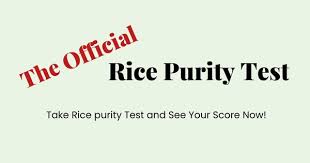The Rice Purity Test is a self-graded survey that originated at Rice University in Houston, Texas. It consists of a series of questions designed to gauge an individual’s level of innocence or experience in various aspects of life. This test has gained significant popularity, particularly among college students, as a means of bonding, amusement, and self-reflection.
History of the Rice Purity Test
The Rice Purity Test has its roots in the early 20th century, believed to have been first introduced as a paper questionnaire distributed among students at Rice University. Over time, it has evolved into an online format and spread to various other educational institutions and social circles.
Purpose and Popularity
People take the Rice Purity Test Questions for various reasons. Primarily, it serves as a form of entertainment and a way to compare experiences with peers. Additionally, it can prompt individuals to reflect on their past actions and behaviors, leading to discussions about morality and personal growth.
How the Test Works
The test typically consists of a list of 100 questions covering a wide range of topics such as relationships, substance use, academic integrity, and personal hygiene. Participants are asked to indicate whether they have ever engaged in each behavior or experienced each scenario.
Scoring and Interpretation
After completing the test, participants tally their “impurity” score based on the number of questions they answered affirmatively. The lower the score, the higher the perceived innocence of the individual. However, it’s essential to recognize that the test’s scoring system is subjective and may not accurately reflect a person’s character or values.
Controversies Surrounding the Test
Despite its popularity, the Rice Purity Test has faced criticism for its potential to promote judgment and stereotyping. Some argue that reducing complex human experiences to a numerical score oversimplifies morality and overlooks individual circumstances.
Impact on Individuals and Society
Participating in the Rice Purity Test can have both positive and negative effects on individuals. While it may spark meaningful conversations and foster a sense of camaraderie among peers, it can also perpetuate societal pressures and stigma surrounding certain behaviors.
Evolution of the Test Over Time
Over the years, the Rice Purity Test has undergone changes and adaptations to reflect evolving societal norms and cultural attitudes. New questions are added, and old ones are revised to ensure relevance to contemporary experiences.
Taking the Test: Tips and Advice
For those considering taking the Rice Purity Test, it’s essential to approach it with an open mind and a sense of humor. Remember that the results are not definitive and should not be taken too seriously. Instead, use the experience as an opportunity for self-reflection and introspection.
Influence on Social Media and Pop Culture
The Rice Purity Test has permeated social media platforms and pop culture, inspiring memes, challenges, and references in various online communities. Its widespread popularity speaks to its universal appeal and ability to resonate with people from diverse backgrounds.
Variations of the Rice Purity Test
While the original Rice Purity Test consists of 100 questions, numerous variations exist with different question sets and scoring criteria. Some versions focus on specific themes or demographics, catering to the preferences of different audiences.
The Test as a Conversation Starter
For many, the Rice Purity Test serves as a lighthearted conversation starter in social settings. It can break the ice and foster connections among strangers or acquaintances, leading to discussions about shared experiences and values.
Cultural Significance
The Rice Purity Test has transcended its origins at Rice University and gained cultural significance beyond academic circles. It has become a recognizable symbol of youth culture and a reflection of societal attitudes towards morality and behavior.
Reflections on Personal Growth
Ultimately, the Rice Purity Test is not just about tallying scores but about reflecting on personal growth and values. It encourages individuals to confront their past actions and consider how they have evolved, contributing to a deeper understanding of oneself.
The Rice Purity Test is more than just a fun quiz; it’s a cultural phenomenon that has sparked discussions about morality, innocence, and personal experiences. While it may have its critics, its enduring popularity underscores its relevance in contemporary society.

